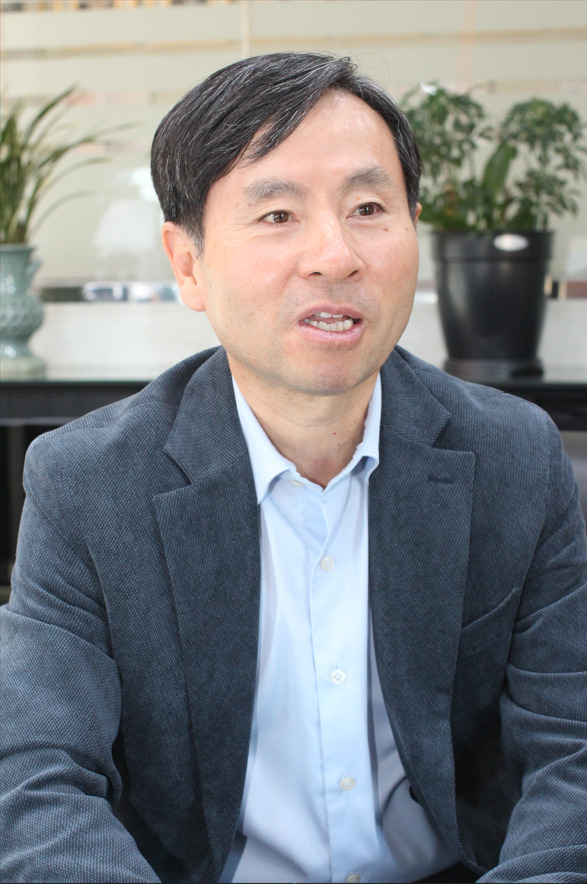[K-Wellness] 'Youth is our country’s bright future and hope'
Korea Youth Counseling and Welfare Institute implements tangible youth policies
By Korea HeraldPublished : Nov. 16, 2022 - 15:00

The Korea Youth Counseling and Welfare Institute, a public institution under the Ministry of Gender Equality and Family, opened in 1993 to help adolescents develop sound character and harmonious growth. The Korea Herald spoke to its President Yun Hyo-sik, who was inaugurated at the end of last year, about the institute’s key activities.
Yun, a leading expert in this field, served as the deputy minister for planning and coordination as well as deputy minister for youth and family policy in the Ministry of Gender Equality and Family.
“I cannot overemphasize the importance of adolescence in life cycle,” Yun said. “A country’s future depends on its youth. We will focus on establishing policies for the youth and by the youth,” Yun added.
Following is a conversation with the institute's president.
The Korea Herald: Can you introduce the Korea Youth Counseling and Welfare Institute’s key role and functions?
Yun Hyo-sik: It is an institution that oversees the operation of youth counseling and welfare centers nationwide and youth welfare facilities, including out-of-school youth support centers, youth shelters and self-reliance support facilities.
We offer various counseling support for adolescents with troubles and worries and who suffer mental health issues including depression and anxiety. We provide services to solve suicide, self-harm, violence, media addiction and emotional and behavioral disorder issues.
KH: How does the institute help teenagers outside of school?
Yun: The out-of-school youth support centers -- now 220 across the nation -- help teenagers return to school, enroll in school, find a job or start a business. The center also provides academic mentoring and scholarship support programs for adolescents preparing for the school equivalency test for high school graduation and college entrance exam.
In particular, we have been carrying out the "youth life record" project since 2020. Because these teenagers don't have "school life records," they face restrictions when applying for early admission to college.
This system prevents such discrimination, as it replaces the "school life record" with "youth life record." Moreover, the number of participating colleges is gradually increasing.
In order to support employment and business, we provide opportunities such as with career search, job training, internships and experience in starting a business.
KH: Adolescent mental health has declined since the COVID-19 pandemic. Can you tell us how the institute addresses this?
Yun: We have been conducting mental health surveys on youth aged 9 to 24 years nationwide for three consecutive years from 2020. The recent survey showed that the number of teenagers experiencing emotional difficulties -- anxiety and worries (55.6 percent), depression (41 percent) and irritation (27.5 percent) -- has grown sharply.
We operate psychological clinics focusing on suicide and self-harm and on anxiety and depression at our selected youth counseling and welfare centers nationwide.
KH: In non-face-to-face situations, it will be difficult to find adolescents with problems.
Yun: We developed a parents intervention guide for socially withdrawn youth and video counseling manual to identify reclusive youth early and deliver services. We have already disseminated the guide and manual to the youth counseling and welfare centers nationwide.
We also operate cyber counseling centers, offering online chat and bulletin board counseling 24 hours a day, 365 days a year. Counseling service is available any time via KakaoTalk, Facebook and text message.
KH: What is the greatest concern among youth today?
Yun: First, there are interpersonal difficulties. Mental health problems have been rising continuously since 2020.
Second, out-of-school youth face discrimination. In many cases, they are treated differently from other school students when they participate in contests, receive discount benefits or seek part-time jobs. We are making efforts to improve this by looking at the examples of cases where their rights were violated.
Third, there are concerns about being self-reliant among out-of-family youths who have been admitted to the welfare facilities such as the youth shelter due to family conflict, violence and abuse. There is an urgent need to improve this system including funds to support self-reliance.
KH: Can you give a message of hope to young people?
Yun: Youth is our country's bright future and hope. Our institute supports every youth who takes on challenges to achieve one's dream and goals. Please knock on our door anytime.
If you are in trouble, you don't have to deal with it alone.
Just contact Youth Counseling 1388, which delivers text and online counseling 24 hours a day, 365 days a year. You can find a good solution if you share your problem with a counselor from the youth counseling and welfare center or dream center.
We will do our best to make your lives happy and healthy.
By Yang Jung-won (7toy@heraldcorp.com)
-
Articles by Korea Herald












![[Today’s K-pop] BTS pop-up event to come to Seoul](http://res.heraldm.com/phpwas/restmb_idxmake.php?idx=644&simg=/content/image/2024/04/17/20240417050734_0.jpg&u=)





![[KH Explains] Hyundai's full hybrid edge to pay off amid slow transition to pure EVs](http://res.heraldm.com/phpwas/restmb_idxmake.php?idx=652&simg=/content/image/2024/04/18/20240418050645_0.jpg&u=20240418181020)

![[Today’s K-pop] Zico drops snippet of collaboration with Jennie](http://res.heraldm.com/phpwas/restmb_idxmake.php?idx=642&simg=/content/image/2024/04/18/20240418050702_0.jpg&u=)